Astellas continues gene therapy push with $50M for stake in Taysha, options on 2 CNS assets
2022-10-24
合作基因疗法并购

Preview
来源: FierceBiotech
A newly announced agreement gives Astellas certain rights when it comes to signing off on any potential change of control of Taysha Gene Therapies.
Astellas will sink $50 million into Taysha Gene Therapies in exchange for a 15% stake in the biotech and the option to license clinical-stage candidates for two rare neurological disorders.
The two adeno-associated virus (AAV) gene therapies in question are TSHA-102, the only gene therapy in the clinic for Rett syndrome, and TSHA-120, which is in phase 1/2 development for axonal neuropathy.
“Taysha is an industry leader in CNS gene therapies and this partnership fits strategically with our long-term vision of expanding Astellas’ gene therapy capabilities, allowing the company to impact the lives of a broader range of patients with urgent unmet medical needs,” Astellas Chief Strategy Officer Naoki Okamura said in a postmarket release Monday.
The agreement also gives Astellas certain rights when it comes to signing off on any potential change of control of Taysha. In the meantime, Astellas will take up an observer seat on Taysha’s board of directors, which the companies said would enable the biotech to leverage Astellas’ clinical and commercial expertise.
Taysha has one other candidate in the clinic that isn't covered by the Astellas deal—a therapy called TSHA-118 in phase 1/2 development for an inherited nervous system disorder called CLN1 disease.
For Astellas, the route into gene therapy offered by the Audentes acquisition hasn’t always gone smoothly. Plans to file AT132 for approval in a rare neuromuscular disease were knocked off course by patient deaths, while the Big Pharma decided to terminate work on a clinical-phase therapy called AT702 for Duchenne muscular dystrophy as well as two earlier-stage candidates for the condition after taking a look at a preclinical study.
更多内容,请访问原始网站
文中所述内容并不反映新药情报库及其所属公司任何意见及观点,如有版权侵扰或错误之处,请及时联系我们,我们会在24小时内配合处理。
适应症
靶点
-来和芽仔聊天吧
立即开始免费试用!
智慧芽新药情报库是智慧芽专为生命科学人士构建的基于AI的创新药情报平台,助您全方位提升您的研发与决策效率。
立即开始数据试用!
智慧芽新药库数据也通过智慧芽数据服务平台,以API或者数据包形式对外开放,助您更加充分利用智慧芽新药情报信息。




